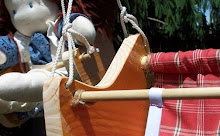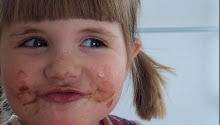Just as a forewarning…this is a super long post…so grab some ice cream and sit down for a nice long read!
My daughter is now old enough to “look” like she is old enough for school, and she most definitely communicates on a level that indicates she should be in school, so we often (read: nearly each time) meet with the question of where she will be going to school this fall as we are out and about. The responses I get to the same question again and again from the complete strangers that we meet fit neatly into three categories. The question is always the same. “Are you going to school this year?”. The answer from her (if she deems the stranger safe to talk to…she’s funny that way!) is always “Yes, I’m a homeschool girl”, and from me…”Yes, she’s homeschooled and will be starting kindergarten this year.”
The responses though…oh the responses!!! In the first category are the dear little scared souls who don’t know how to respond and utter a simple “Oh”, though their faces are communicating so much more confusion, judgment, and bewilderment than their verbal answer held. The second response is by far the easiest to hear…it’s the “Oh, my sister homeschools her children and they just love it”, or “Good for you, we homeschool as well”, or “Oh…my next door neighbors boss’s wife’s best friends homeschools…that’s great!”, or various other common-ground finding and reaffirming answers out there. The third is the trickiest. It is given by those who homeschool, those who might like to but haven’t taken the plunge, or those who simply like to learn about the many wonderful ways to live and learn. This third response is simply a string of questions…”how will you do it,” “what curriculum will you use”, “how will you socialize her?”, “so what will homeschooling look like for you?” …and so many many more questions.
The very scary thing is that I don’t know all the answers to all these questions that I find myself presented with on a very regular basis. For a long time this “scary thing” was a slightly paralyzing fear. The planning portion of my brain was struggling with the thought of proceeding down a path that I hadn’t completely figured out yet. It took several intense conversation with my (wonderfully handsome) sensible husband to come to the terms with the (wildly obvious to most…) fact that the journey of homeschooling is just that…a journey. That the beauty, wonder, and magic of this journey will be discovered and unveiled as we go. That the organization and logistics and (slightly boring) record keeping aspects can also be developed, refined, and perfected along the way. That a journey means breathing. Odd that we need to be reminded to do something as inherent as breathing.
For us, at this moment, homeschooling will look like many things. Our methods are not for purists. In fact a purist may balk at the framework I have established for our journey. Our homeschooling will look like Waldorf, it will look like Montessori, it will look like the International Baccalaureate Program, it will look like Classic Homeschooling, it will look like Christian Homeschooling…but most importantly, and most of all it will look like us. A combination of many many wonderful and inspired ideas and philosophies. If there was a phrase that defined my approach to homeschooling methods it would be “…if there is anything virtuous, lovely, of good report or praiseworthy, we seek after these things.” In this way we work to incorporate every good thing regardless of the origin.
Many of you are so far beyond me in comprehension and implementation of these wonderful educational philosophies. Perhaps some of you haven’t heard much of them. For those of the latter group, of which I was a part just two minutes ago (or so it seems!!!), here is a brief explanation of three of the main philosophies that make up our very own personalized Little Robinsons Homeschooling Method.
Most of our day is immersed in the Waldorf philosophies and they will of course play an enormous role in our homeschooling.
Waldorf education is based on the research and works of philosopher Rudolf Steiner. Waldorf ideals for education emphasize an awakened disciplined, creativity, wonder, reverence, and respect for nature and human existence. Waldorf methods have proven to offer a holistic educational model designed to provide the right stimulus at the right time and allow each child’s abilities to fully unfold. The aim of Waldorf schooling is to educate the whole child, head, heart, and hands, to produce individuals who are able, in and of themselves, to impart meaning to their lives.
The curriculum of a Waldorf school, and likewise our own homeschooling will be as broad as time will allow and balances academic subjects with artistic and practical activities. Rich with tied to the earth goodness and the rhythmic seasons and celebrations the magic and wonder that the Waldorf philosophy captures will fill our days and imaginations.
Some Waldorf sites I resource:
Maria Montessori’s inspired works were my first introduction to education beyond public or private religious schooling. Though I am not a Montessori purist, I find great value in her teachings and apply so many of her principles to my parenting and likewise the teaching of my children.
Dr. Maria Montessori’s methods center around her experimental observations of young children given freedom in an environment prepared with materials designed for their self-directed learning activity. It’s aim is to bring about, sustain, and support a child’s natural way of being, having an inner natural guidance for his or her own perfect self-directed development. The role of teacher (sometimes called director, directress, or guide) is to therefore watch over the environment to remove any obstacles that would interfere with this natural development, and to show how to use the various self-teaching materials that are provided in the environment for the children’s free use.
One of the points of Montessori’s teaching that I most align myself with is the concept of independence and self-directed learning facilitated by a prepared environment and subtle guidance rather than “teacher”-directed instruction and presentations.
A few Montessori sites to resource:
International Baccalaureate Program
I stumbled across this program one day and was immediately impressed by the rigor and breadth of the academics. While the freedom, creativity, imagination, and self-discovery of the Waldorf and Montessori methods largely drive my personal educational philosophies I also desire my children to to acquire an extensive and “top of the line” academic education.
The International Baccalaureate Program mission statement:
The International Baccalaureate aims to develop inquiring, knowledgeable and caring young people who help to create a better and more peaceful world through intercultural understanding and respect. To this end the organization works with schools, governments and international organizations to develop challenging programs of international education and rigorous assessment. These programs encourage students across the world to become active, compassionate and lifelong learners who understand that other people, with their differences, can also be right.
The IB program includes a special program for children in the kindergarten to fifth grade years. This Primary Years Program is the framework for the IB curriculum and is driven by concept acquisition and is inquiry based. As most of the air space in our home is filled with “why?” questions all day everyday an inquiry based curriculum seems a perfect pitch. In the traditional PYP students explore mathematics, science and technology, languages, social studies, arts, and personal, social, and physical education. In working out the answers in these areas children build skills such as reading, reasoning, researching, and communicating. The program also promotes positive attitudes and good character emphasizing respect, tolerance, integrity, and confidence, encouraging children to reflect, choose wisely, and act responsibly in the home and community.
So how did we put this all together? Using the PYP program curriculum found here I chose the areas that I wanted to explore over the year. I chose not to use the language program they use at all but will instead use the Montessori reading methods. I sketched out what this curriculum will look like for the year creating a calendar and rough schedule on personalized documents. (I’ll share these tomorrow!) These documents will act as a framework for what I would like to cover for the year. Ah…but within that framework exists the true beauty and magic of self-directed learning, imagination, curiosity, exploration, and discovery. A framework for our months…and freedom within our days.
IB and PYP information for your reading pleasure!:
It will be a journey. An eclectic mix of the genius of many different philosophers which does not necessarily create a new genius…but rather something unique and just right for us. Which is the just the way homeschooling should be….just right for each little soul in the home.










